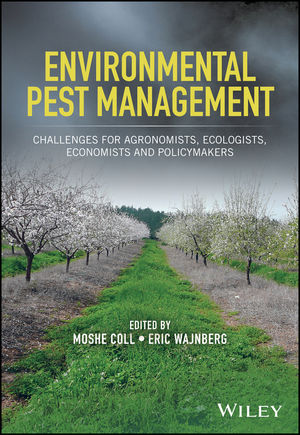News
Environmental pest management: Challenges for agronomists, ecologists, economists and policymakers
Edited by Moshe Coll & Eric Wajnberg. Wiley.
ISBN: 978-1-119-25555-0, Oct 2017, 448 pages, Excerpt (pdf), Table of Contents (pdf)
Order here: E-Book or Hardcover
Reviewed by Geoff Gurr (published in the IOBC-Global Newsletter, Issue 102, Dec. 2017):
It is often said that you cannot judge a book by its cover. In the case of this book, it is hard – indeed misleading – to judge it by its title. "Environmental Pest Management" conjures up two kinds of meanings, either pests of built structures or pests in natural systems. This book is about neither of these. The environmental slant of the book is twofold. First, the influence of pest management practices on the environment (e.g., pesticide pollution, possible effects of transgenic plants and rogue biocontrol agents) and, second, the influence of the environment on pests and their management (e.g., non-crop vegetation as source habitat for natural enemies). It will be apparent from the forgoing description, then, that the scope of this volume is wide. Reflecting this, Moshe Coll and Eric Wajnberg have recruited a large team of contributing authors from 13 countries to contribute 18 chapters. These are neatly arranged into seven parts that deal with background, impacts of pest management practices on the environment, the influence of unmanaged habitats on pest management, the effects of climate change, public heath, policy, and conclusion.
At a more strategic level this book has an important and ambitious mission in calling to arms the many workers in different fields related to pest management to bring about a radical change from the current way of 'doing business'. In the concluding chapter, Coll and Wajnberg draw-together key messages from the earlier, contributed chapters to argue for a longer-term, top-down approach in which goal-based agri-environmental schemes are established along with policies to account for the true, full costs of current reliance on pesticides. These measures are recommended to be complemented by a reinvigoration of public sector extension services (to lessen the influence of private sector advisory services with their vested interests), and the filling of information gaps by goal-specific research to fine tune policy settings. This is reflected in the book's sub title, "Challenges for Agronomists, Ecologists, Economists and Policymakers". The argument will resonate with many who work in the field but potentially would have been more persuasive for those on the fringes had the term "challenges" been used in some section and chapter titles (and appeared in the index) in order to weave a more unified argument. Certainly Donald Trump will be no fan of this "big government", "anti-business" approach and the recent rise of his type of philosophy in global politics suggests that this book might struggle to gain immediate policy momentum in all but the most enlightened jurisdictions. Notwithstanding that observation, there is plenty of excellent content here to interest a readership ranging from advanced undergraduate to seasoned scholar and professional. It is rare for a volume such as this to include contributions from diverse fields so Coll and Wajnberg's book will be a valuable resource for anyone seeking to widen their understanding of the Gordian knot of pests and their management.
Readers of this newsletter will find a good deal of information relevant to biological control. David Jennings and co-authors cover the environmental impacts of biological control, a theme revisited later in the book in the chapter by Barbara Barratt and Clark Ehlers; Stefano Colanzza and team deal extensively with biological control in the more broadly titled chapter on ecosystem services, while Mark Gillespie and Steve Wratten also focus largely on biological control in their chapter on ecosystem dis-services.
If there is a gap in this wide ranging volume it is that, whilst developed countries are amply represented by authors from North America, Europe, Australasia, there is much less here for the reader interested in other parts of the world. There seem to be no chapter authors from Asia, South and Central America, Africa or the Pacific. Arguably it is in these less developed areas where there is the most need for steps to be taken to begin applying the book's message. Maybe a second volume could broaden the reach to these regions where cultural, economic and other factors differ – sometimes radically – to the situations found in more developed nations. This is an important book with a clear mission – I hope it can succeed!
Environmental Pest Management: Challenges for Agronomists, Ecologists, Economists and Policymakers
Moshe Coll and Eric Wajnberg (Editors)
ISBN: 978-1-119-25555-0, Oct 2017, 448 pages, Excerpt (pdf), Table of Contents (pdf)
Order here: E-Book or Hardcover
Share Information
Please share your information by sending any kind of news to the IOBC Secretary General

